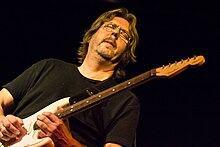
Aarhus is the second-largest city in Denmark and the seat of Aarhus municipality. It is located on the eastern shore of Jutland in the Kattegat sea and approximately 187 kilometres (116 mi) northwest of Copenhagen.

Ole Christensen Rømer was a Danish astronomer who, in 1676, made the first quantitative measurements of the speed of light.

Lars Martin Jørgensen is a Danish former professional footballer played as a midfielder or defender. He works as talent manager for AGF.

Aarhus Municipality, previously known as Århus Municipality until 2011, is a municipality in Central Denmark Region, on the east coast of the Jutland peninsula in central Denmark.

Aarhus Stadium is an association football stadium located in Aarhus, Denmark which has been the home ground of Aarhus Gymnastikforening since the 1920s. With a current capacity of 19,433, it is the third largest football stadium of any football team in Denmark. It is part of the sports complex, known as Aarhus Sports Park, that is run by Ceres Park & Arena.

Shu•bi•dua or Shu-bi-dua is a Danish pop group that was formed in 1973 in Copenhagen, as an expansion of the group Passport. Throughout their 40-year history, Shu-bi-dua changed their lineup many times, however their lead singer Michael Bundesen was with the band throughout, except for the gap between 1984 and 1987. They have produced many well-known hits in Denmark, like Vuffeli-vov, Hvalen Hvalborg, Står på en Alpetop, Stærk Tobak, Familien kom til Kaffe, Sex Chikane, We wanna be free, and many more.
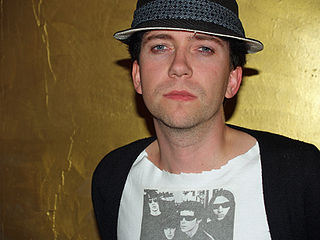
Sune Rose Wagner is a Danish songwriter, guitarist, and singer, best known for playing in the rock group The Raveonettes. In addition to his own bands, Wagner has produced, recorded, and mixed albums by acts such as Dum Dum Girls, Crocodiles, and Louise Burns.

East Jutland metropolitan area is a potential metropolitan area in Jutland and Funen, Denmark. Aarhus is the most populated city in the region.

Arkitektfirmaet C. F. Møller, internationally also known as C. F. Møller Architects, is an architectural firm based in Århus, Denmark. Founded in 1924 by C. F. Møller, it is today the largest architectural firm in Denmark based on number of employed architects. About half the revenue is earned outside Denmark. Besides the main office in Århus, the firm has offices in Copenhagen, Oslo, London and in 2007 it bought the Stockholm-based Swedish architectural practice Berg Arkitekter which is still operated under its own name.
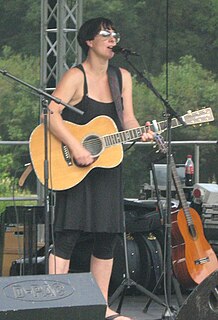
Jette Torp is a Danish singer and entertainer. Born in Frederiksberg, Copenhagen, the family moved to Ry near Skanderborg in Jutland when she was five years old.

Lukas Graham is a Danish pop band consisting of lead vocalist and multi-instrumentalist Lukas Forchhammer, bassist Magnus Larsson, and drummer Mark Falgren. The band released their first album, Lukas Graham, with labels Copenhagen Records and Then We Take The World in 2012. The album peaked at number one on the Danish charts. Their second album was released in 2015 and earned international attention with singles like "Mama Said" and "7 Years", the latter of which topped the singles charts in many major music markets. The self-titled international debut album was officially released in the United States by Warner Bros. Records on 1 April 2016.
The Gypsies are a Danish hip-hop / R&B band with a live sound instead of using backing tracks or turntables. The band's sound is characterized by vocalists Shaka Loveless and Benjamin Kissi. The other members are: Lasse Boman (guitar), Peter Blonde (bass), Andrew Hagedorn (keyboards) and Birk Nevel (drums). The band began before the 2000s as The Electric Gypsies with a more rock-oriented sound. With the addition of Benjamin Kissi, the group moved to a more urban sound and a consequent change of name to The Gypsies.

Shaka Loveless Grøn is a Danish rapper and singer with reggae roots. He is also a lead vocalist for the Danish hip-hop / R&B band The Gypsies.

Rasmus Ole Lyberth is a Greenlandic singer, songwriter and actor. Since 1970, he has been one of the most popular artists in the Greenlandic music scene. His music is well known beyond the borders of Greenland.
Shit & Chanel was a Danish girl band in pop rock and folk rock established in 1974. The Aarhus-based band was made up of Anne Linnet, Astrid Elbek, Lis Sørensen, Lone Poulsen and Ulla Tvede Eriksen.

The Joint Arctic Command is a direct Level II authority in the Danish Defence. Joint Arctic Command's primary mission in peacetime is to ensure the Unity of the Realm sovereignty by monitoring the area around the Faroe Islands and Greenland. The command also handles tasks such as fisheries inspection, Search and Rescue (SAR), patient transport and other tasks that support the civil society. In short, the Joint Arctic Command handles military tasks, coast guard duties and disaster response - all in one organisation.

Carl Christian Møller was a Danish concertmaster and composer. His father was a musician and early in his life Carl Christian was hired in the Danish Civil Artillery Music Corps and later became a musician in the 2nd Brigade Music Corps while also playing in Hans Christian Lumbye's orchestra. He participated in the First Schleswig War as a musician but from the 1850s and the rest of his life he worked as leader of different orchestras, initially travelling ensembles but in 1857-64 and 1875-85 he led the orchestra of Folketeatrets in Copenhagen. From 1875 until his death he was a popular leader of Tivoli's concert band.
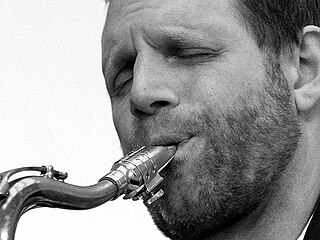
Jan Harbeck is a Danish jazz musician and composer.
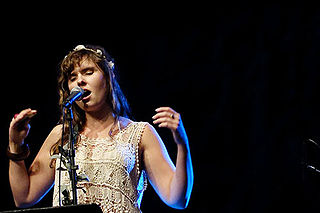
Live Foyn Friis is a Norwegian singer, lyricist and composer, with roots in jazz, pop and improvised music.
Constituencies are used for elections to the Folketing, the national parliament of Denmark. Denmark proper is divided into 10 constituencies largely corresponding to the Provinces of Denmark, each electing multiple members using open-list proportional representation. Those constituencies are then divided into 92 opstillingskredse which mainly serve the purpose of nominating candidates, but historically functioned as single-member constituencies electing one member using plurality voting.
